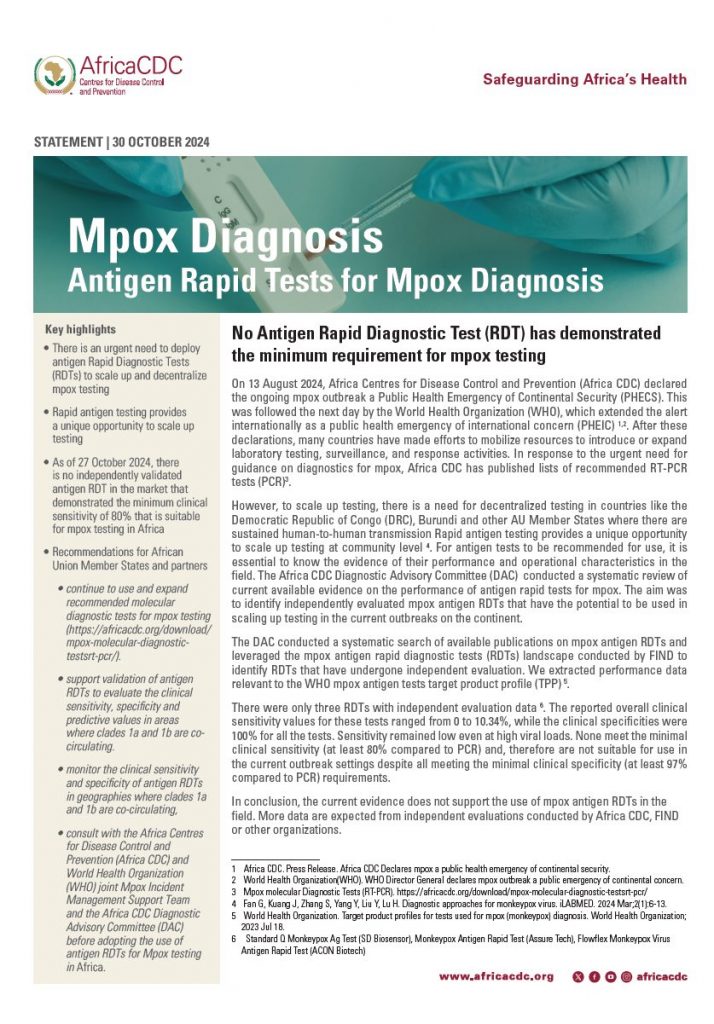No Antigen Rapid Diagnostic Test (RDT) has demonstrated the minimum requirement for mpox testing.
On 13 August 2024, Africa Centres for Disease Control and Prevention (Africa CDC) declared the ongoing mpox outbreak a Public Health Emergency of Continental Security (PHECS). This was followed the next day by the World Health Organization (WHO), which extended the alert internationally as a public health emergency of international concern (PHEIC). After these declarations, many countries have made efforts to mobilize resources to introduce or expand laboratory testing, surveillance, and response activities. In response to the urgent need for guidance on diagnostics for mpox, Africa CDC has published lists of recommended RT-PCR tests (PCR).
However, to scale up testing, there is a need for decentralized testing in countries like the Democratic Republic of Congo (DRC), Burundi and other AU Member States where there are sustained human-to-human transmission Rapid antigen testing provides a unique opportunity to scale up testing at community level. For antigen tests to be recommended for use, it is essential to know the evidence of their performance and operational characteristics in the field. The Africa CDC Diagnostic Advisory Committee (DAC) conducted a systematic review of current available evidence on the performance of antigen rapid tests for mpox. The aim was to identify independently evaluated mpox antigen RDTs that have the potential to be used in scaling up testing in the current outbreaks on the continent.
The DAC conducted a systematic search of available publications on mpox antigen RDTs and leveraged the mpox antigen rapid diagnostic tests (RDTs) landscape conducted by FIND to identify RDTs that have undergone independent evaluation. We extracted performance data relevant to the WHO mpox antigen tests target product profile (TPP).
There were only three RDTs with independent evaluation data 6. The reported overall clinical sensitivity values for these tests ranged from 0 to 10.34%, while the clinical specificities were 100% for all the tests. Sensitivity remained low even at high viral loads. None meet the minimal clinical sensitivity (at least 80% compared to PCR) and, therefore are not suitable for use in the current outbreak settings despite all meeting the minimal clinical specificity (at least 97% compared to PCR) requirements.
In conclusion, the current evidence does not support the use of mpox antigen RDTs in the field. More data are expected from independent evaluations conducted by Africa CDC, FIND or other organizations.
Key highlights
• There is an urgent need to deploy antigen Rapid Diagnostic Tests (RDTs) to scale up and decentralize mpox testing
• Rapid antigen testing provides a unique opportunity to scale up testing
• As of 27 October 2024, there is no independently validated antigen RDT in the market that demonstrated the minimum clinical sensitivity of 80% that is suitable for mpox testing in Africa.
Recommendations for African Union Member States and partners
1- Continue to use and expand recommended molecular diagnostic tests for mpox testing (https://africacdc.org/download/mpox-molecular-diagnostictestsrt-pcr/).
2- Support validation of antigen RDTs to evaluate the clinical sensitivity, specificity and predictive values in areas where clades 1a and 1b are cocirculating.
3- Monitor the clinical sensitivity and specificity of antigen RDTs in geographies where clades 1a and 1b are co-circulating,
4- Consult with the Africa Centres for Disease Control and Prevention (Africa CDC) and World Health Organization (WHO) joint Mpox Incident Management Support Team and the Africa CDC Diagnostic Advisory Committee (DAC) before adopting the use of antigen RDTs for Mpox testing in Africa.
